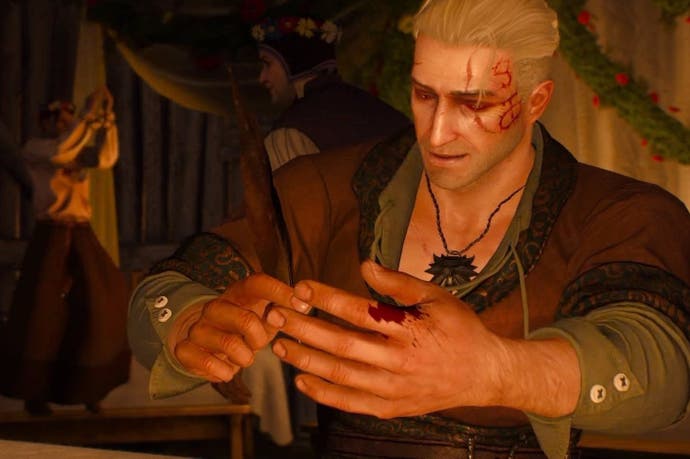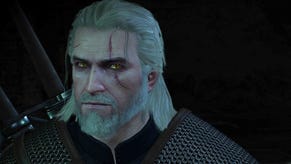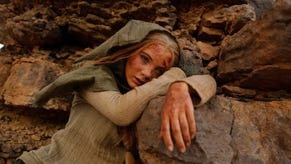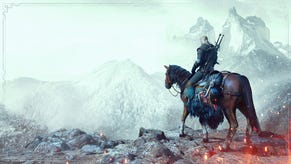The Witcher 3: Hearts of Stone review
Don't mine if I do.
Editor's note: While not going into specifics, this review does reveal some minor story details - so be warned if you want to go into Hearts of Stone completely fresh.
Hearts of Stone is the Witcher's 3 first proper DLC and it's a weird little beast. On one hand, it all but personifies what made the side quests in the core game so exemplary. The 10-hour campaign is stippled with irreverent humour, punctuated with sly pop-culture references, and bubbling over with ideas that other RPGs wouldn't even think about frolicking with. In its best moments, Hearts of Stone is hilarious and harrowing and hopeful, sometimes all at the same time.
In its worst moments, though?
It's okay. Not terrible, not unplayable and not something that would lace your tongue with the taste of arsenic. Just okay. More of the same, you could say. Far too much of the same, in fact. While Hearts of Stone tries its best to subvert expectations, it's also constrained by its nature. Much of it involves beating up people, beating up bosses, using your Witcher senses to locate people, and occasionally playing cards. If you're not willing to be enchanted by the narrative, you're really just getting more Witcher with your Witcher. (Which isn't necessarily a bad thing, but still.)
But let's put that aside for an instant. Let's talk about Hearts of Stone. What do you do here? It starts innocuously enough, with Geralt sullenly appraising a notice board bristling with menial quests. He makes a droll statement to someone nailing a new request on the wood, and is enticed with a new contract. Having nothing better to do, he goes to acquaint himself with one of the expansion's primary players: Olgierd von Everec.
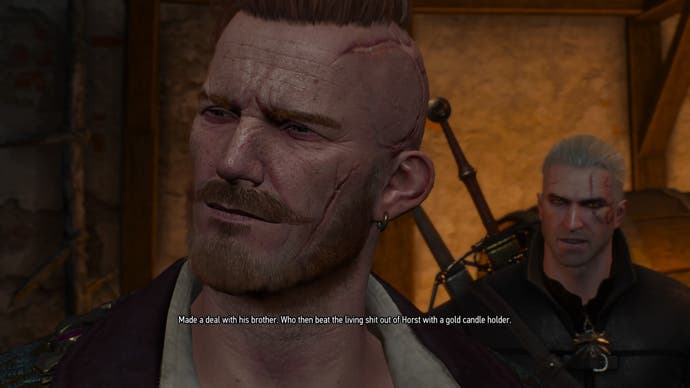
Even from the beginning, CD Projekt makes it amply clear that Olgierd is, despite being an antagonistic force, someone to be empathized with. Despite keeping the company of extraordinarily earthy Wild Ones, he's also a connoisseur of sculptures. Despite having an artist's eye, he's willing to destroy works of art on whim. The list of dichotomous behaviors goes on. Within the first ten minutes, it's hammered home that Olgierd has facets and is, like most of the characters in The Witcher 3, a person of ambiguous moral standing.
Very ambiguous, as the case may be. Hearts of Stone, as was the case with The Witcher 3, is defined by its characters, and this expansion introduces some wonderful new acquaintances, such as Gaunter O'Dimm. Those who paid attention during The Witcher 3 will recognize the Man of Glass from the prologue sequence, although he's somewhat less innocuous here than when he was helping you locate Yennefer. Mysterious, potentially malevolent, and strangely genial, Gaunter quickly establishes himself as something of a trickster, an unimaginably powerful force behind a round face and a calm smile.
His early appearances are an absolute joy to witness. Gaunter neither flaunts his abilities nor does he shy from acknowledging their existence. Similarly, he simultaneously info-dumps while still withholding any meaningful data, a duality of natures that fluidly feeds into one another. There's a clear sense that our Master Mirror is dangerous, but at the same time, he's just so damn polite. This balance holds true up till the middle of the expansion when he starts becoming more stereotypically [REDACTED], but even then, he's always fun to encounter.
The supporting cast is equally delightful. Shani, for one, comes across as a professional with no time to waste on itinerant Witchers, a woman with neuroses and fears but also enough confidence to pursue her own desires, regardless of what her insecurities might say. And without giving away too much, there's a certain ghost in Hearts of Stone that absolutely steals the show.
Circumstances entrust you with the task of amusing him for a single night and you do, with all the reluctance you'd expect of Geralt, at first. He's our Witcher's polar opposite, boisterous and boastful, hopelessly rash and knowingly self-dramatic. He flirts outrageously and indulges in casual mischief with all the abandon of a teenager on summer vacation. Most of all, he affects a blatant love for life. It's a shockingly delightful inversion of the idea that spectres are tragic figures. Hearts of Stone's main revenant wastes absolutely no time at all moping about the past. He has one night to live, and by god, he's going to live it.
His quest chain, as a result, is arguably the best thing you're going to find in Hearts of Stone. For one, there's him. For another, it also does reasonably clever things with the existing ideas in The Witcher 3. You'll use his innate ability to track items to woo women, deploy Signs to make friends with household pets, and generally do all the things you'd expect a Witcher to do without properly hurting someone. What seals the quest line for me, though, is how perfectly this builds up into a genuinely affecting climax. (Won't spoil. Shan't spoil. Don't look at me that way.)
As for the other quests you find in Hearts of Stone, I'm slightly less enthused. There's a segment where you begin collecting characters for a high-risk heist. It's remarkably well-presented, a slightly camp Ocean's Eleven that nonetheless makes you eager to assemble your cast of villains. But it unfortunately flops at the delivery.
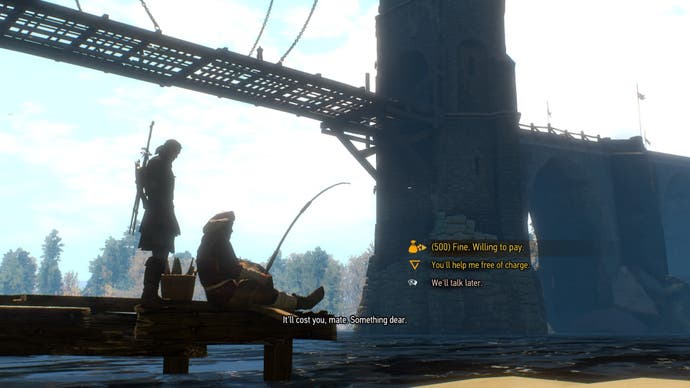
Here is my biggest beef with the expansion: it's far too reliant on cutscenes. Make no mistake, they're elegant performances, some of which might have you straining on the edge of your seat. But they're also that. Performances. Non-interactive sequences that require absolutely no input from you. And that's a shame, really, especially if you're pulling off a robbery and must carefully calculate your movements so you can slip between patrols, all the while alert to the possibility someone might ring the alarm. I'd really like to have been able to do that myself, but alas.
To repeat, Hearts of Stone's more pedestrian moments aren't terrible. Just okay. While a strong sense of missed opportunities pervades the experience, the DLC does also work to its strengths. Boss battles, for example, feel more strategic than ever. Running in and bashing one with your sword won't work. You'll want your Oils, your Signs, your ability to decipher telegraphs. Hearts of Stone seems to work on the assumption you've at least spent some amount of time with the main game, and even at normal difficulties, it's not shy to throw a curveball at you. (Tangentially related, apparently alcohol can have an adverse effect on romance scenes.)
So. Yay? Nay? Maybe? That depends on how much more The Witcher 3 you can take. If you're a fan, if you're keen for more content, if you're just not done with the world, the answer is: yes. Absolutely. Hearts of Stone probably won't do much but aggravate you if you had no appetite for the core game, but for others this is more of The Witcher 3 in all its imperfect glory.
